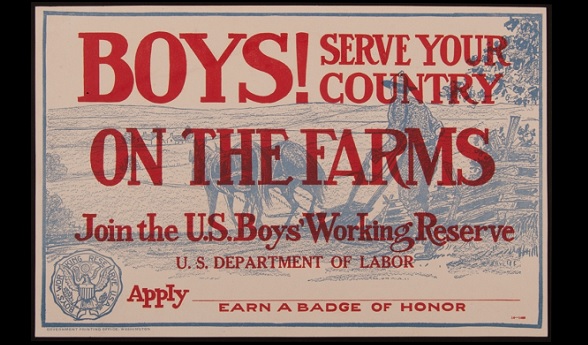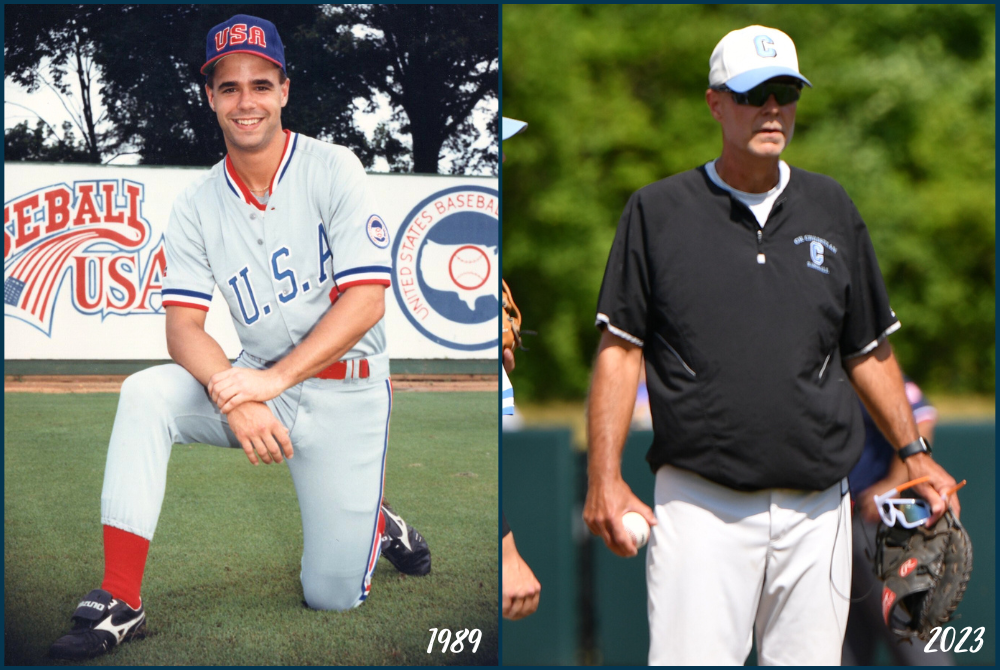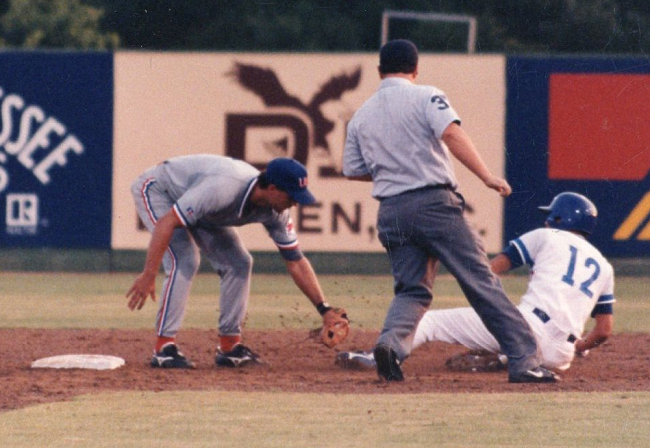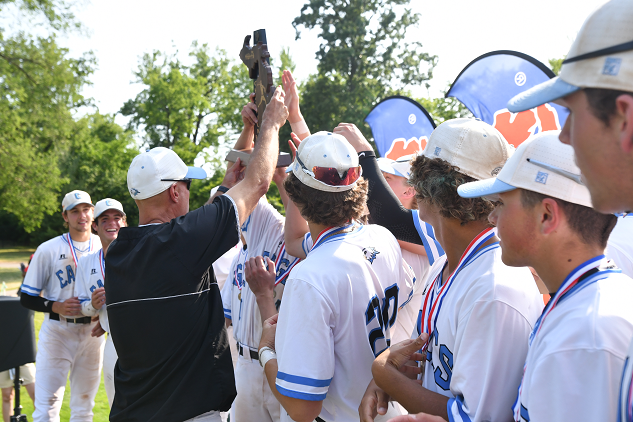
'Over Here,' Athletes Gave to WWI Effort
March 28, 2018
By Ron Pesch
Special for Second Half
In a nation at war, the needs of many outweigh the desires of a few.
Among the many noble sacrifices for the greater good was Michigan’s spring high school sports season of 1918.
The United States’ entry into “The Great War” (today commonly known as World War I) came on April 6, 1917, 2½ years after the war had begun. First elected President of the United States in 1912, Woodrow Wilson earned re-election in 1916 under a platform to keep the U.S. out of the war in Europe. The sinking of the British passenger ships Arabic and Lusitania in 1915 caused the death of 131 America citizens, but did not invoke entry into the conflict. However, continued aggressive German actions forced a reversal in policy.
“The present German submarine warfare against commerce is a warfare against mankind,” stated Wilson in an April 2 special session of Congress, in requesting action to enter the war.
A huge baseball fan, President Wilson recognized the value of entertainment and athletics during a time of crisis. Major league baseball, America’s pastime, completed a full schedule in 1917. A former president at Princeton University, on May 21, 1917, Wilson addressed the value of school athletics in a letter to the New York Evening Post.
 “I would be sincerely sorry to see the men and boys in our colleges and schools give up their athletic sports and I hope most sincerely that the normal courses of college sports will be continued so far as possible, not only to afford a diversion to the American people in the days to come when we shall no doubt have our share of mental depression, but as a real contribution to the national defense. Our young men must be made physically fit in order that later they may take the place of those who are now of military age and exhibit the vigor and alertness which we are proud to believe to be characteristic of our young men.”
“I would be sincerely sorry to see the men and boys in our colleges and schools give up their athletic sports and I hope most sincerely that the normal courses of college sports will be continued so far as possible, not only to afford a diversion to the American people in the days to come when we shall no doubt have our share of mental depression, but as a real contribution to the national defense. Our young men must be made physically fit in order that later they may take the place of those who are now of military age and exhibit the vigor and alertness which we are proud to believe to be characteristic of our young men.”
Despite the highest of hopes, the requirements and realities of war deeply impacted life in the U.S. soon after.
In February of 1918, a proposal was circulated by Dr. John Remsen Bishop, principal of Detroit Eastern High School and president of the Michigan Interscholastic Athletic Association, to abolish spring athletics at Michigan high schools. Due to a labor shortage brought on by the war, the states, including Michigan, needed help on farms, harvesting crops from spring until late fall. The action might also affect the football season of 1918.
The Boys’ Working Reserve, a branch of the U.S. Department of Labor, was organized in the spring of 1917 and designed to tap into an underutilized resource to help address that labor deficiency. “Its object was the organization of the boy-power of the nation for work on the farms during the school vacation months.”
While the idea was popular among schools around Detroit, due to the lack of public commentary from outstate school administration, it was expected that the proposal would meet at least some opposition when the M.I.A.A. gathered on Thursday, March 28 in Ann Arbor during a meeting of the state’s Schoolmasters Club.
Less than two weeks prior to the March meeting, Michigan Agricultural College made an announcement that would impact one aspect of the coming spring sports season.
“The department of athletics of the Michigan Agricultural College begs to inform the high schools of the state that plans for the annual interscholastic track meet, which was to have been conducted here in June, have been given up this year – not through any desire on the part of this department to discourage athletics, but because this is a time when we can and should devote our resources to better uses,” said coach Chester L. Brewer of the Aggies to the Lansing State Journal. “It would hardly be sound judgment for us to make our usual elaborate plans for this meet while our government is appealing to all of us to economize and exercise the utmost thrift. Neither is it wise policy to encourage unnecessary traveling upon the railroads, or to ask high schools of the state to make any expenditures other than those which are absolutely necessary.”
Earlier in the year, similar news had come from the University of Michigan.
In January of 1917, the University of Michigan had announced plans for an elaborate annual high school basketball invitational, designed to identify a Class A state champion. Billed as the “First Annual Interscholastic Basket Ball Tournament,” the March event hosted 38 teams. However, influenced by the war, a decision had been made not to run a second tournament in 1918. Instead, on March 27, Kalamazoo Central and Detroit Central, two of the state’s top teams, were invited to Ann Arbor for a hastily arranged contest at U-M’s Waterman Gymnasium. The schools had split a two-game series during the regular season. Kalamazoo won the season’s third matchup, and while not official, declared itself 1918 Michigan state champion.
Into this environment of patriotism and uncertainty, school administrators arrived in Ann Arbor for the Schoolmasters gathering. There, in the morning, the membership heard a presentation from H. W. Wells, assistant and first director of the Boys’ Working Reserve. “The heart of the nation, rather than the hearts of the nation, is beginning to beat. War is making us a unit,” said Wells, discussing the aim to recruit boys between the ages of 16 and 21 to help provide food for the allies in Europe and at home in the United States.
 “Wells told of the need for the farmers to sow more wheat, and plant more corn,” reported the Ann Arbor News, “and in the same breath he told of great corn fields all over the country, where last year’s corn still lay unhusked, because of a lack of farm labor.”
“Wells told of the need for the farmers to sow more wheat, and plant more corn,” reported the Ann Arbor News, “and in the same breath he told of great corn fields all over the country, where last year’s corn still lay unhusked, because of a lack of farm labor.”
It was estimated that 25 percent of the nation’s farm workforce was now active in the armed forces.
The proposition was brought to the M.I.A.A. by Lewis L. Forsythe, principal at Ann Arbor High School, who would soon establish himself as a guiding force in high school athletics. The proposal “was discussed thoroughly.”
“This session is usually a stormy one, because of contentions that arise over rulings that affect schools in different ways,” said Adrian superintendent Carl H. Griffey to the Adrian Daily Telegram, “but this meeting was a serious one in which all matters were related to our national welfare and passed by unanimous votes.”
So, one day after the conclusion of the abbreviated state basketball championship contest, the spring prep sports season in Michigan came to an abrupt halt. Michigan’s male high school students were asked to work to support the war effort.
“Chances are that they will remain there for the duration of the war,” stated the Lansing State Journal in response to the action. “At the meeting … it was talked of quitting football because of the need of the boys staying on the farms till the latter part of November. This is highly probable. If it is passed upon then Michigan high schools will have but one sport, basketball.
“Whether intra-mural sports will replace the representative teams is not known. This form of athletics demands the attention of a great number of teachers to tutor the different class organizations. The teachers are taxed to the limit at present and cannot give the time to sports. Organizing farm classes and Liberty bond teams is taking the teacher’s spare moments. … But still athletics are needed, as the war has demonstrated, and physical training should be instituted from the kindergarten to the university.“
“Those lads who leave for the farms the first of May,” wrote the Port Huron Times-Herald, “will be in better condition when they return home from the fields and cow lanes than they would (have) had they remained in the city until June batting the leather pill.”
The fate of the 1918 football season would not be known until late August.
In late June, the 29th Governor of Michigan, Albert E. Sleeper, thanked the estimated 8,000 students who had joined the ranks.
 “To you soldiers of the soil I would say this, that I am as proud to address you as I would be to address any of the boys who are bearing arms for their country. You have proved that you are true patriots, for you have started out to do exactly what your country has asked you to do – the thing which you can do best for your country at this time.
“To you soldiers of the soil I would say this, that I am as proud to address you as I would be to address any of the boys who are bearing arms for their country. You have proved that you are true patriots, for you have started out to do exactly what your country has asked you to do – the thing which you can do best for your country at this time.
“Every day, in the rush of official work, I think of you Reservists as you work on the farms, just as I think of our soldiers who are in training camps or ‘over there.’ And I am just as proud of you as I am of them. So are all the people of Michigan.”
It was estimated “the boys who last spring left their high school studies and as members of the United States Boys’ Reserve have helped the Michigan division to add $7,000,000 to the food production of the nation.”
In September, Byron J. Rivett, secretary of the M.I.A.A., announced that, based on a vote of member high schools, prep sports would be resumed in the fall. The Detroit News celebrated the news that “moleskins and pigskins will be in evidence and the grand old game will be a part of the autumn’s entertainment.”
In October, in Grand Rapids and Detroit and other cities across the state, officials gathered to honor those who served as part of the “Michigan Division of the Reserve” and to award bronze badges in recognition for their contribution to the war effort.
World War I officially ended on November 11 with the signing of the armistice. Armistice Day, today known as Veteran’s Day, was first celebrated in 1919. In total, an estimated 16 million were killed during the war.
“Four million ‘Doughboys’ had served in the United States Army with the American Expeditionary Forces (AEF). Half of those participated overseas,” said Mitchell Yockelson in Prologue magazine, a publication of the National Archive. “Although the United States participated in the conflict for less than two years, it was a costly event. More than 100,000 Americans lost their lives during this period.”
More than 5,000 of those casualties had come from Michigan.
***
 To the surprise of the world, a second war arrived in 1918. This one did not discriminate based on geographic or political borders. It would take more lives than World War I.
To the surprise of the world, a second war arrived in 1918. This one did not discriminate based on geographic or political borders. It would take more lives than World War I.
Globally, the Spanish Flu pandemic arrived in three waves, one in the spring, one in the fall of 1918, and a third arriving in the winter of 1919 and ending in the spring. It, too, would impact high school and college athletics in Michigan and beyond, as countless football games across the nation were cancelled in an attempt to help reduce the spread of the disease.
In the end, an estimated 675,000 would die in the United States from the virus. In Michigan, hundreds succumbed in October 1918 alone. In Detroit, between the beginning of October and the end of November, “there were 18,066 cases of influenza reported to Detroit’s Department of Health. Of these, 1,688 died from influenza or its complications.” Worldwide, an estimated 50 million were killed by the Influenza pandemic of 1918-1919.
 Ron Pesch has taken an active role in researching the history of MHSAA events since 1985 and began writing for MHSAA Finals programs in 1986, adding additional features and "flashbacks" in 1992. He inherited the title of MHSAA historian from the late Dick Kishpaugh following the 1993-94 school year, and resides in Muskegon. Contact him at [email protected] with ideas for historical articles.
Ron Pesch has taken an active role in researching the history of MHSAA events since 1985 and began writing for MHSAA Finals programs in 1986, adding additional features and "flashbacks" in 1992. He inherited the title of MHSAA historian from the late Dick Kishpaugh following the 1993-94 school year, and resides in Muskegon. Contact him at [email protected] with ideas for historical articles.
PHOTOS: (Top) The U.S. Department of Labor recruited high school students to work on farms as soldiers went oversees to fight World War I. (Middle top) A Working Reserve badge. (Middle) Lewis L. Forsythe. (Below) Another recruitment poster for the Working Reserve shows a man plowing a field while war rages in the background. (Photos collected by Ron Pesch.)

Vast Experience Shapes Retired MLB-er Gates Into 3-Time Finals-Winning Coach
By
Steve Vedder
Special for MHSAA.com
August 1, 2023
If there is anything that Brent Gates knows for sure, it's that there is no single explanation for three MHSAA Finals baseball championships.
 For starters, the Grand Rapids Christian coach credits the superior coaching he had as a youngster, especially for helping him make the Michigan High School Baseball Coaches Association Dream Team in 1988.
For starters, the Grand Rapids Christian coach credits the superior coaching he had as a youngster, especially for helping him make the Michigan High School Baseball Coaches Association Dream Team in 1988.
From there, Gates points to the experience gained as a former Big 10 Baseball Player of the Year, a seven-year major league playing career that saw him rubbing shoulders with such notables as Hall-of-Famer Tony LaRussa and Minnesota Twins manager Tom Kelly, and then landing at a high school where the critical support he received from players, community and administration was priceless.
Put it all together and that, at least in part, explains Gates becoming the first Grand Rapids-area baseball coach with three state titles on his resume.
The Eagles' 2-1 win over Grosse Pointe Woods University Liggett in the June 17 Division 2 Final marked Gates' third title as a coach. His Grand Rapids Christian clubs had previously won back-to-back titles in 2012-13.
Gates passed former Grandville Calvin Christian coach Jay Milkamp as the Grand Rapids-area coach with the most state titles. Milkamp won in 1994 (Class C) and 1996 (Class B).
Gates, a member of three Halls of Fame, is quick to deflect the credit for three championships and two other championship game appearances. What he treasures most is being mentioned in the same breath as other legendary west-side coaches such as Jenison's Gary Cook, Ron Engels of Wyoming Park, Hudsonville's Dave Van Nord, East Grand Rapids' Chris LaMange, formerly Rockford and now Ada Forest Hills Eastern's Ian Hearn and Milkamp, most of whom Gates either played against while an all-stater at Grandville or through coaching at Grand Rapids Christian.
"I'm just a small piece of what has transpired in 11 years," he said. "Just to be mentioned with them and their success is an honor. (Three titles) is not an individual thing, but because of many people and what they can do working day in and day out together.
"I've always said the west side doesn't get the recognition it should in baseball. There are some great coaches here with great baseball talent, and I think you see that in the postseason."
If basketball can spawn what is affectionately known as "gym rats," then Gates is surely a classic example of the diamond's version of someone who has lived and breathed baseball his entire life. He was a two-time all-stater at Grandville who went on to a standout career at the University of Minnesota that included a lifetime .387 batting average. He was named the Big Ten Player of the Year in 1991 and consensus All-American. Gates played internationally with USA Baseball on the 18U team in 1988 and then the collegiate national team in 1989 and 1990. Over those two seasons on the collegiate team he appeared in 68 games, hitting a combined .363 with 49 runs scored and 54 RBIs.
He was drafted by the Oakland A's in the first round (26th overall) of the 1991 draft and went on to hit .264 in 685 major league games over seven seasons.
 Upon his retirement, Gates founded the Frozen Ropes training facility in Grand Rapids, worked as a scout for the Tampa Bay Rays, became the West Michigan Whitecaps' second-ever manager in 2001, coached Byron Center for two years and has compiled a remarkable 298-89 record in two coaching stints at Grand Rapids Christian.
Upon his retirement, Gates founded the Frozen Ropes training facility in Grand Rapids, worked as a scout for the Tampa Bay Rays, became the West Michigan Whitecaps' second-ever manager in 2001, coached Byron Center for two years and has compiled a remarkable 298-89 record in two coaching stints at Grand Rapids Christian.
After virtually a lifetime in baseball, Gates said his coaching success can be spread in many directions. He said it began at Grandville, was influenced by such managers as John Anderson at Minnesota and LaRussa and Kelly at the major league level, and with brushing shoulders with many of Grand Rapids' most successful coaches.
The experience led him to a coaching philosophy that includes a priority on building relationships with players, providing a full explanation of his thinking to the players, a quiet but firm coaching of fundamentals, and, above all, communication. If there is anything that Gates does not do, it's relying on the "old-school" coaching method where coaches demand excellence in no uncertain terms.
"I've taken little bits and pieces from a lot of people," said Gates, a member of the Grandville, University of Minnesota and Grand Rapids Halls of Fame. "I want players to figure out who they can be. Whether it's Ken Griffey Jr. as a hitter, Randy Johnson as a pitcher or Terry Steinbach in catching, you don't just take one person and say who can I be? If you want to compete at a high level, you need to be better than anyone you go up against.
"Part of being a good coach, and it doesn't matter if it's a 9U program or high school, is about making players understand and be able to apply what they learn. Baseball is a hard game, one of failure where if you succeed three times out of 10, you're a star. You have to get players to understand failure."
Gates said all three Grand Rapids Christian champions were marked by different strong suits. The 2012 club, for example, breezed its way to a 36-5 record, while the 2013 club finished the regular season just 12-15 but put together a torrid seven-game winning streak during the tournament. This year's team was marked by a deep pitching staff and what Gates describes as a "group of gamers."
"All of them were different, but I firmly believe that pitching and defense win championships," Gates said. "But you also have to get hot at the right time."
It's not unusual for major leaguers to completely hang up the spikes once their playing days are over. They're tired of the pressure, the frustration of fading talent and losing the battle with Father Time, and the constant travel away from family. Gates faced all that and still found himself enthralled with the idea of coaching.
 "I've loved the game since I was like 4 years old. There's nothing better than smelling pine tar or the look of manicured grass. The smells and sounds of baseball, that's what I love," he said.
"I've loved the game since I was like 4 years old. There's nothing better than smelling pine tar or the look of manicured grass. The smells and sounds of baseball, that's what I love," he said.
One of his coaching goals is to impart the love of the game to his players. And it seems the message is getting across.
"It's awesome playing for him," said first baseman/pitcher Ty Uchman, who graduated this spring. "He gets us to focus on the little things. If there is something on our minds, we know we can go to him. He's an open book. I know he'll always talk to us, and that builds trust and a bond."
Another recent grad, infielder Kyle Remington, will follow Gates' footsteps to the University of Minnesota and said one particular trait sticks out to him about his coach.
"He's very patient," Remington said. "There are all levels of players in high school, and he treats them all the same. Doesn't matter if they're struggling; he never raises his voice. He's a very comfortable and relatable coach to play for.
"He knows baseball is a game of failure so if you don't understand a drill or an adjustment to have to make, he'll talk to you in a patient way."
Gates said he suspected even when he was a major leaguer that coaching was likely in his future.
"I did, and it was an easy decision. God has a plan, and I had a feeling I would stay in the game," he said. "Baseball has given me everything. I love the game, and I know I've been blessed. I want to take what I've learned and pass it along. That's always been a part of me."
2023 Made In Michigan
July 25: After All-American Career, Rockford's Bennett Making Impact as Mat Mentor - Read
July 20: Oakridge 3-Sport Star Potts Applying Lessons to 'Second Chapter' in Sales - Read
July 18: Frankfort Hoops Staff Bolstered by Past Stars Giving Back in Banktson, Kreski - Read
July 12: Championship Memories, High School Tennis' Impact Stick with Hackett Pair - Read
July 6: Brother Rice Finals Hero Aiming to Ace Family Life, Financial World - Read
July 5: Lapeer West 4-Time Finals Winner Set to Build Champions at Oklahoma - Read
PHOTOS (Top) Brent Gates appears on the USA Baseball collegiate national team in 1989 and makes a pitching change during this spring’s Division 2 Final. (Middle) Gates makes a tag at second base while playing for the national team. (Below) Gates presents the championship trophy this season to his Grand Rapids Christian players. (National team photos courtesy of USA Baseball.)

